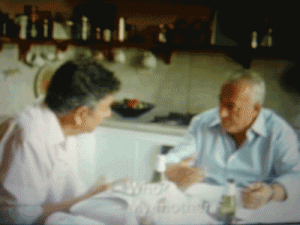 Mid-August Lunch (Pranzo di Ferragosto), 2010. Directed by Gianni Di Gregorio, written by di Gregorio and Simone Riccardini. Starring a melancholy di Gregorio, Valeria De Franciscis, Marina Cacciotti, Maria Calì, Grazia Cesarini Sforza, Alfonso Santagata, Marcello Ottolenghi, and Petre Rosu with his wild, wild hair.
Mid-August Lunch (Pranzo di Ferragosto), 2010. Directed by Gianni Di Gregorio, written by di Gregorio and Simone Riccardini. Starring a melancholy di Gregorio, Valeria De Franciscis, Marina Cacciotti, Maria Calì, Grazia Cesarini Sforza, Alfonso Santagata, Marcello Ottolenghi, and Petre Rosu with his wild, wild hair.
I once heard a critic say that the outrageous spectacle of Avatar is what movies are all about. Well, I have to say I think that’s a load, and not just because I think Avatar is a load, and definitely not because I think outrageous spectacle is a load. Inglorious Basterds, Flash Gordon, and the forthcoming The Good, the Bad, and the Weird are all ridiculous spectacle, and I love them for it.
See, the movies are about everything. Like like poetry, like literature, like music, you can get any and every human emotion from the art. Poetry is the clash of swords and the breaking of skulls in The Iliad, just as it’s Mary Oliver channeling her grief over the death of her partner in “When I am Among the Trees”. One stirs your imagination and makes you grit your teeth and grimace (happily) at the violence, while the other suggests you sit quietly in the dark and offer a prayer of genuine thanks to the silver maple twisting sideways in your front yard. There’s room for both.
In cinema, with the summer movies coming crashing down upon us, there’s room for Iron Man 2, for Braveheart 2: Robin Hood, and there’s room–plenty of room–for the small gift that is Mid August Lunch. What is the story? Well, sit for a moment, and think back to a day in your life when you had guests, or were on vacation and met someone new, or say, were meeting people you weren’t sure you wanted to meet. Friends of friends, perhaps, neighbors at a cabin who invited you next door to barbecue and against your internal warnings you said, “Why not?” A situation you weren’t particularly excited about… but that turned out beautifully, a pleasant and joyous evening, where personalities that did not exactly match or had much in common mixed perfectly, the way strong flavors sometimes combine to form a thing totally new, startling, wonderful.
That is Mid-August Lunch in a nutshell. Gianni (Gianni di Gregorio, who wrote Gomorrah, about as different a film as you can possibly imagine) plays a middle-aged man who drinks too much, but lives a decent life with his mother (Valeria De Franciscis), cooking and sipping wine and hanging out with his wild-haired, homeless friend (Petre Rosu.) Apparently, the Italians have a holiday on August 15, Ferragosto, perhaps similar to our Thanksgiving (supposedly to celebrate the end of summer and the hard work in the fields.) People take time off, go on their last holiday, or get together to eat and eat, hang out, and eat some more. Sounds delightful.
Well, Gianni and his mother are in hard times. They haven’t paid their electrical bill in ages, nor kicked in their share of a repair on the condo they’re renting. Their landlord, Alfonso (Alfonso Santagata) comes by, sighing and shaking his head and refusing Gianni’s wine, and he needs some money. Gianni doesn’t have the money. Alfonso’s got a solution: if Gianni takes Alfonso’s mother off his hands for the Mid-August holiday, he’ll erase the bill. Gianni says yes. What else is he going to say?
Alfonso comes by the next day with his mother, Marina (Marina Cacciotti), and his aunt Maria (Maria Calì–if you haven’t guessed by now, all the characters share the names of the actors in real life). Gianni is stunned–now he’s got to take care of three elderly women? Where is he going to sleep?
Of course, it gets worse. Gianni has a weak ticker, and when his doctor (Marcello Ottolenghi) stops by for a check-up and listens to Gianni’s tales of woe, it sets the wheels in motion: well, if Gianni’s already got three women on his hands, how hard would it be to add a fourth? And so the story goes. The doctor’s mother, Grazia (Grazia Cesarini Sforza), visits, and her son has a laundry list of items she cannot eat, like no tomatoes in the afternoon, as the acidity ruins her sleep. Her digestive system can’t handle cheese.
Grazia, of course, hungers for all of these, especially after witnessing Gianni’s beautiful pasta dishes (and after being given a plate of “beautiful”–Gianni’s word–boiled vegetables.) But Mid-August Lunch does not devolve into a madhouse. Gianni di Gregorio and Simone Riccardini are not content to have the old woman shoveling down food that will turn her into a vomit machine, or someone with night terrors, or [insert body-fluid joke here]. Nor do the women act like little children… this is not the Italian Cocoon. We’re not even entirely certain the old lady has the maladies her son claims she suffers from… in fact, I think her son is overly cautious.
The old women share stories, bicker a bit, apologize, puff and preen at times, there’s some minor hurt feelings, but for the most part everyone gets along, friendships grow, and dinner is made, served, and consumed. (I might add, that in this age of “food porn”, di Gregorio again gets it just right: there are no interminable scenes of his cooking, or shots of people rolling their eyes and moaning as they eat. Like a great wine, everything is perfectly balanced here.)
At the center of this lovely movie is the portrait of a lonely man. di Gregorio’s performance is a masterpiece of understatement, and I can’t remember an actor who has got so much expression from his eyes. Truly, he is a beautiful man to look at. We sense that there is a sadness and longing in him, for what man (or woman) would be content to have no money, to live with their mother, and have only two or three companions: a homeless dude, a wine merchant, and a doctor?
And yet there’s no moment where Gianni confronts his mother, and Mid-August Lunch is not about people “growing”, as they do so abruptly and unnaturally in American movies of this ilk. Mid-August Lunch is about a group of people–no one with crazy quirks, no one who thought they were a failure at first and a hero by the end–who get together and celebrate the life they have been given and this particular day. They taste and appreciate every moment in this short (barely 70 minute) film.
There’s a small surprise at the end of Mid-August Lunch that, like a small glass of the finest dessert wine, puts the perfect finish on this blessed little film. When it was over, my wife and I sat, content, sighing, and turned off the TV (we watched a screener), and just read a bit before bedtime. It was warm out that day, and the windows were open a bit, and I paused from my Philip Levine to admire my wife and the sounds of the wind rustling the new leaves.
Mid-August Lunch, then, was the perfect summer movie, not a roller-coaster, not a raucous event like the State Fair (both a blast, for sure), but like a leisurely picnic, or a dinner at a sidewalk cafe that makes you appreciate, deeply and profoundly, your food, your drink, and, most of all, the people with whom you share life. And lately, and perhaps as I get older, I find that I appreciate that over a blockbuster any day. 
